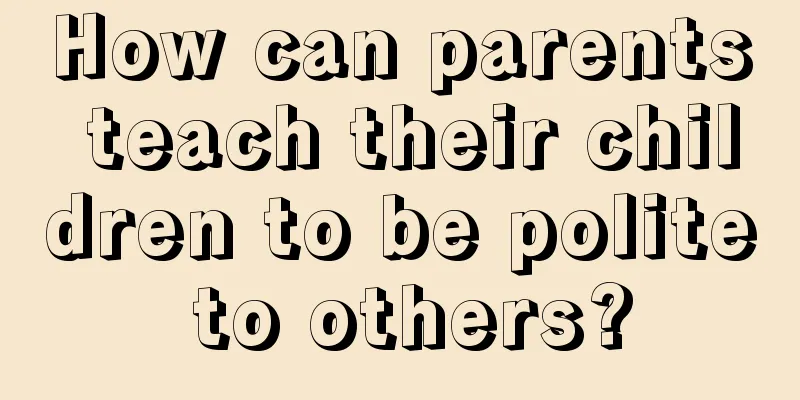How can parents teach their children to be polite to others?

|
Being polite and having good manners are essential qualities for good children, and they can help children grow up healthily. When babies grow up and integrate into groups, these will affect their future interpersonal relationships. So how do parents teach their children to be polite to others? How do parents teach their children to be polite? When the baby's language development is unimpeded and he begins to have social behavior, parents should pay attention to the first step of their social etiquette - greeting. Tell the child clearly that greeting is a kind of courtesy and is necessary. If the child is often reluctant to say hello, you can explain the advantages and disadvantages to the child. Demonstrate to the child. Parents should also greet the child. For example, the first sentence you can say to the child when you get up in the morning is: Good morning. When visiting friends, parents should also say: Hello so-and-so when they see someone, and then ask the child to greet the other party. When the child greets others, parents should give positive praise or encouragement, and let him continue to do so in order to develop a habit. Politeness is an important touchstone for people's social interaction. If the baby can develop the habit of actively greeting others, then his future interpersonal relationships may be half successful. After the child starts to learn to speak, the object of learning is naturally from the family members who live with him day and night; if the family members speak politely, the child will naturally follow suit. Find out the reason for speaking impolitely. Although children's words are valuable, they can sometimes make people laugh and cry. For example, children do not understand the true meaning of words and make jokes, which may even be indecent, embarrassing or hurtful. Experts believe that parents should understand the reasons why their children say inappropriate words, such as where did they learn it from? Why do they say it like this, etc., and find out the reasons before trying to stop it. Family language and television media can be said to be the common sources of language learning for children today. When children speak rudely, parents should correct them immediately. Communicate with children in a sympathetic way, and children will definitely understand. Children are learning anytime and anywhere, so the environment created by parents is very important. In addition to talking, children's behavior can also reflect their politeness scores. The most common politeness problems of babies are not queuing and snatching things. Experts say that children usually do not queue up or cut in line because they want to be quick, get candy or play with toys faster. First offense: Children may forget to queue up because of excitement at first. Parents may remind them slightly, and there is no need to criticize them loudly immediately. Repeated persuasion: calling the child aside and letting him be the last one to serve means delaying the giving of food. Afterwards, communicate with the child and ask him: You didn’t line up properly. You wanted to be faster, but ended up being slower… The child will naturally evaluate the gains and losses of such results. It is very important to cultivate politeness in young children. As long as parents teach from a young age, practice in life, and let the environment cultivate, the baby will naturally be a polite and popular social person! |
>>: How much does painless childbirth cost? Why is painless childbirth not recommended?
Recommend
What should I do if the due date has not come yet? What should women pay attention to during pregnancy?
Many women are pregnant for about ten months. Aft...
What to eat for breast hyperplasia What to eat for breast hyperplasia
Breast hyperplasia is not scary, good care is the...
Should children's teeth be thrown away? What should children's teeth be filled with?
Children will start to replace their teeth at a c...
Can a ten-month-old baby eat yellow peaches? What are the benefits of eating yellow peaches for babies?
Because ten-month-old babies are too young, many ...
What should I do if my baby has a sore throat? What should I eat to cure my baby's sore throat quickly?
Babies are not fully developed in all aspects, so...
The disadvantages of children not liking to drink water. What should I do if my baby doesn’t like to drink water in summer?
Summer is here, and many babies sweat a lot when ...
At what age should babies start getting self-paid vaccines? Where can babies get self-paid vaccines?
For the safety of your baby, in addition to the v...
How much does a Flair food processor cost and how to use it
Food processors have many benefits. They can blen...
Happy Baby Xibei rice noodles are real or fake. How to identify the real and fake Xibei rice noodles?
Happy Baby Rice Noodles is a long-established Ame...
When should I start using a birthing ball? What are the functions of a birthing ball?
In order to relieve the pain of parturients, more...
The harm of painless childbirth injections and painless childbirth experience
Everyone is familiar with painless childbirth. It...
What should I do if my baby has a fever? Why does my baby have red spots on his body?
We all know that pregnant women and newborn babie...
Why do pregnant women drool when they sleep?
When we sleep, we often find that when we wake up...
What should you pay attention to when your baby takes a nap in winter? What are the wrong ways for babies to take a nap in winter?
Many babies like to take naps. So, what should we...
What are the reasons for insufficient breast milk? What should I do if I don’t have enough breast milk?
What are the reasons for insufficient breast milk...








